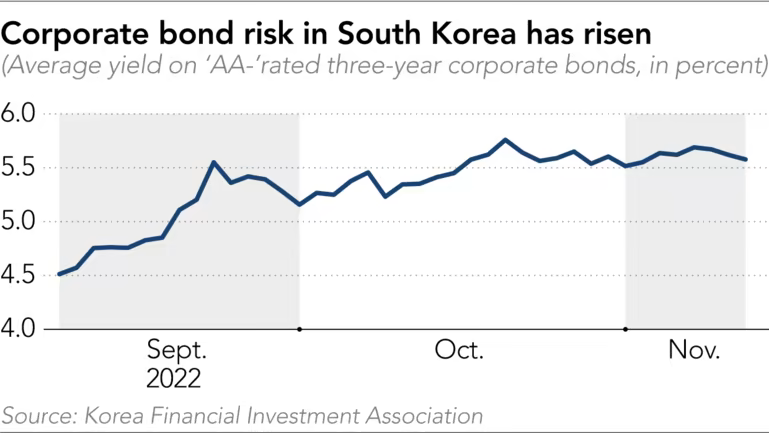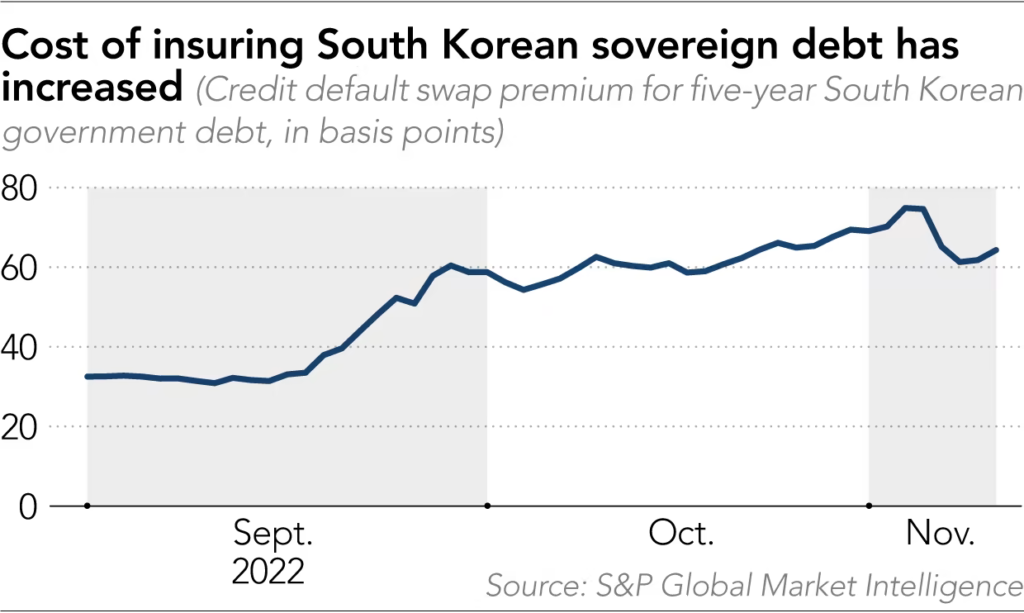When Korea Electric Power Corp. the country’s largest utility and holder of a AAA credit rating, raised only half the money it sought from the bond market last month, it showed the extent of the corporate meltdown.
South Korea Electric Power raised 590 billion won ($432 million) in October, less than half of its target of 1.2 trillion won, according to Chung Il-young, a Democratic Party lawmaker who obtained information from the company. The company confirmed that it had provided him with the information.
Experts point to Gangwon Province’s announcement that it will not repay Gangwon Jungdo Development Corp., which is owned by the province and developed the Legoland Korea Resort amusement park, as the trigger for the crisis debt.
Gangwon decided to file for bankruptcy of Gangwon Jungdo Development “to avoid paying back 205 billion won borrowed from BNK Securities,” the province’s new governor, Kim Jin-Tae, said at a press conference on September 28.

Later, surprised by the reaction of the market, the governor promised to repay the debt by December 15, but it was too late to calm the nerves of Investors worried about the creditworthiness of corporate borrowers, which led to a loss of market liquidity and a sharp rise in yields. The average yield on three-year AA-rated corporate bonds was 5.69% last week, compared with 4.537% two months ago, according to data from the Korea Financial Investment Association.
To calm the market, President Yoon Suk-yeol’s government and the Bank of Korea announced on October 23 that they will inject at least 50 trillion won into the bond market after Finance Minister Choo Kyung-ho held an emergency meeting with Governor Rhee of the BOK. Chang-Yong and other policymakers.
With the liquidity provision program, the government began to buy corporate bonds and commercial paper through a 20 trillion won fund. The government also doubled the size of its government bond purchase program to 16 trillion won.
Analysts said the measures may not be enough to stabilize markets, where credit conditions are the toughest since the global financial crisis.
“We believe that current policy measures provide only limited short-term relief and are unlikely to address the potential risks of a system-wide credit crisis,” Nomura economist Park Jeong-woo said last month. “Our Nomura-KRFCI Financial Condition Index rose to its highest level since the 2008 global financial crisis in October amid rising credit stress.”
Investor concerns about South Korean companies spilled over into overseas bond markets after small insurers Heungkuk Life Insurance and DB Life Insurance said they would not repay their US dollar-denominated perpetual bonds at their expected maturity dates, citing adverse market conditions.
A perpetual bond is a bond that has no maturity date, but the market took the companies’ announcements as a warning sign because issuers typically redeem perpetual bonds on maturity dates.
Later, Heungkuk and DB, supported by their parent companies and local lenders, changed their minds about exercising their options when the financial regulator forced them to bail out.
But analysts say the government’s action was inappropriate because it could get companies in legal trouble.
“We see the actions of regulators and authorities as exceptional.” “While steps have been taken to stabilize the volatility in the domestic Korean earnings market and Korean issuers in the US dollar market, the processes do not reflect well on the regulator or the company,” Pramod Shenoi, head of Asia-Pacific research at CreditSights, said on Wednesday.
“We understand that issuers are also not legally allowed to withdraw a redemption notice once it has been issued and that some investors have considered legal action against Heungkuk Life,” Shenoi said. Fitch Group’s
CreditSights’ research unit said emergency measures led by South Korea’s regulator led to a rise in insurance fixed bond prices in Asia.

Investors are watching whether a loss of confidence in South Korean corporate bonds spills over into stock and currency markets. So far, Seoul’s stock market has weathered the corporate bond crisis, with its benchmark KOSPI up more than 14% since late September. South Korea also won by a score of 7.4% against the US dollar during the same period, however, the credit default swap premium on South Korea’s five-year government bond, which indicates the risk of default, has risen sharply in recent months. In November, it more than doubled to 74.98 from 32.73 two months ago, hitting a five-year high, according to Sandra Global Market Intelligence.
Economists say that South Korea’s economic fundamentals are strong enough to stave off a corporate bond crisis.
“It makes no sense to compare the current situation with past currency crises,” said Oh Suk-tae, senior economist at Societe Generale, referring to the Asian financial crisis of 1997-1998. “Stocks are rising and the exchange rate is stable.” I think the market will test South Korea more like the UK has recently.”
Oh, the BOK holds the key to solving the crisis because the central bank can slow the rate-hike cycle to prevent bond yields from rising. Governor Rhee announced his intention to raise the benchmark interest rate to curb inflation.
Investors will not buy bonds now if they expect their yields to rise. It all depends on the price. “The BOK can take a small step this time,” Oh said, awaiting the central bank’s decision to raise interest rates. it’s key. interest by a quarter of a percentage point at the next meeting in November. instead of 2 percentage points to stabilize the bond market.
Clarification: This article has been amended to clarify the circumstances of the bankruptcy filing by the developer of Legoland Korea Resort
Source:Nikkei





Leave a Reply